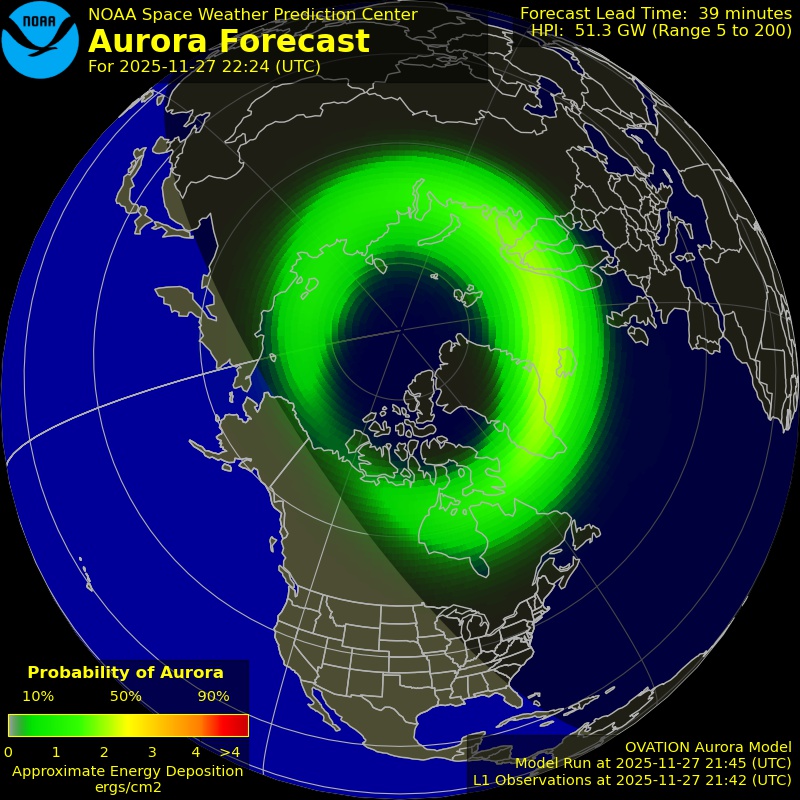Northern Lights Forecast for Edmonton
Substorm
Substorm Phase: Quiet; Aurora Activity Score: 16/100
Ideal Conditions for Northern Lights in Edmonton:
Power: +40 Gw | Bz: -2 | Wind Speed: 400+ | Density: 4+ | Kp: 4+ (minimum 3)
If the data above meets or exceeds the power meets then the aurora borealis should be visible within Edmonton.
Don’t Miss the Magic!
Stay ahead of the Northern Lights with real-time alerts. Subscribe now to receive a text or call whenever the aurora is active—so you never miss a moment of the show.
Northern Light Tours in Alberta
Check out our selection of Aurora Borealis and Night Sky tours for Alberta.
How to use this data:
There’s no mistake! You want to see the northern lights in Edmonton. Using this tool as a source we can better predict the northern lights.
We take live satellite data and place it into an easy to read dashboard filtering the noise. But- this can all be confusing. Follow our “how to” for more information”
Use our long range forecast to plan a trip well in advance and nail it down with more local minute to minute insights.
Where to see the northern lights in Edmonton?
Viewing the aurora borealis in Edmonton is actually better out of city limits. The reason is light pollution.
Here is some popular spots for photographing the Aurora Borealis in Edmonton and area:
- Elk Island National Park: Just a short drive from Edmonton, Elk Island National Park offers a serene and picturesque backdrop for capturing the Northern Lights. The park's dark skies and minimal light pollution provide an ideal setting to witness the auroras in all their splendor. Head to Astotin Lake or the Bison Loop for stunning reflections and unobstructed views.
- Miquelon Lake Provincial Park: Roughly 30 minutes southeast of Edmonton, Miquelon Lake Provincial Park presents another excellent location for photographing the Northern Lights. The park's open landscapes and calm waters make for captivating reflections and wide-angle shots of the auroras.
- Victoria Settlement Historic Site: Steeped in history, this site offers a unique opportunity to combine the Northern Lights with historical landmarks. Located approximately an hour and a half northeast of Edmonton, the site's rustic structures can add a sense of scale and narrative to your aurora photography.
- Saskatchewan Drive Outlook: If you’re looking to risk it our favourite place for in-city viewing is the Saskatchewan Drive Outlook. This location requires strong data than you would out of the city lights.
When can you see northern lights in Edmonton?
Usually after dark around 11:00 PM to 3 AM the next morning. On very strong nights the northern lights have been able to be seen much earlier.
When is the best time of year to see the aurora borealis in Edmonton?
The aurora borealis, or, northern lights can be see all year round. Usually winter months are deemed as prime viewing because there is longer hours of darkness.
Can you see the northern lights in Edmonton tonight?
That depends on the data coming in. For best results keep an eye on Aurora Admin and track the data coming in. If the target criteria is met then there is a good change for aurora.
How long do the Northern Lights usually last?
The Northern lights in Edmonton only show for brief periods at a time, usually for only a few minutes then they die down for a bit. A good display may last for no longer than 15-30 minutes at a time, although if you’re really lucky, it could extend to a couple of hours or longer.
Aurora Oval
Northern Hemisphere

